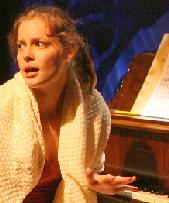SITE GUIDE
SEARCH
REVIEWS
REVIEW ARCHIVES
ADVERTISING AT CURTAINUP
FEATURES
NEWS
Etcetera and
Short Term Listings
LISTINGS
Broadway
Off-Broadway
NYC Restaurants
BOOKS and CDs
OTHER PLACES
Berkshires
London
California
New Jersey
DC
Philadelphia
Elsewhere
QUOTES
TKTS
PLAYWRIGHTS' ALBUMS
LETTERS TO EDITOR
FILM
LINKS
MISCELLANEOUS
Free Updates
Masthead
Writing for Us
A CurtainUp Review
A Feminine Ending
By Elyse Sommer
|
I want to be a great composer.—Amanda So write great music.—David, her father. I don't have time. I have a full-time job. I have a fiancé to love. I have a mother, newly single, who I have to look after. I have you to worry about. I have to make dinner. I have a bathroom that gets dirty. . .—Amanda |

Gillian Jacobs in A Feminine Ending
(Photo: Joan Marcus)
|
Ms. Treem's concerns are largely, but not exclusively, feminist and expressed from the unique perspective of a young classical music composer. Thus, as befits a musician's story, the play's scenes are presented as seven movements with a da capo finish that takes us back to the beginning.
Besides the musical movements to give a symphonic cohesiveness to the various and knotty threads of Amanda's life, there are other musical metaphors to add piquancy. Her introduction to music began with her playing the oboe. Her mother, who always encouraged her to be extraordinary, recommended it because it would make her stand out from the crowd (in an orchestra, from the more abundant instruments like the violins and violas). But while her mother wasn't wrong and Amanda loved the oboe's strength, she also found it a lonely instrument that tuned the whole orchestra, but couldn't itself be tuned. That's why, like many another oboists, Amanda abandoned what she calls "the Hamlet of instruments" to devote her musical studies to composing.
Composing classical music is not a quick path towards fame and fortune, especially for a woman. Consequently, Amanda, unlike her female contemporaries studying medicine or law, found few past or present role models so that her experience as a music student often made her feel as lonely as the oboe she used to play. With success still a vague maybe, what Amanda did find in her last year of grad school was a handsome, charming boyfriend named Handel. Unlike the famous composer with the same surname, Jack Handel's musical interest lies in singing popular music. In fact, he's about to be "huge" — as in rockstar huge. While Jack's being on the verge of stardom appeals to Amanda, her mother is less than thrilled. The romance to her means that her daughter might end up nurturing Jack's career rather than her own, which has already been somewhat detoured with a job as an advertising jingle writer to pay her rent and support her loftier ambition.
Staying with the metaphor of the oboe, Amanda's increasingly complicated life is no longer automatically tuned. In addition to keeping her about to be famous fiancé happy and attending to her jingle writing job, she's pulled back to her New Hampshire home where her mother is having a marital crisis—a crisis which has apparently been ongoing for most of her married life. That trip home forces her to finally bring all those strings pulling her this way and that into harmony —even if that harmony means a "feminine ending" which is a musical term for "a movement that ends in an unstressed note or weak cadence" and in literature refers to a technique called a "dying rhyme".
Ms. Treem's play is not without problematic plot points. The paths of classical music and popular music students tend to be far apart. Amanda would most likely be enrolled in a music conservatory rather than a large university and Jack's not recognizing a well-known Chopin piece she plays, makes it unlikely that he would be enrolled in a classical voice program and only started singing rock as part of the university open mic basement club where they met. The frustrations of Amanda's mother and her tying her own decision to leaving her thirty-year marriage to Amanda's marrying or not marrying Jack seem a bit forced but with Marsha Mason as Kim in one of her always welcome returns to the New York stage, you tend not to quibble about any shortcomings in the character she's been given. One also doesn't like to nitpick with anything about the somewhat surreal charm that those New Hampshire " movements" bring to the play— especially an encounter with Billy, an old boyfriend and the conversation with her father with his priceless observations on life in general, and marriage and creative achievement in particular.
Gillian Jacobs is appealing and proficient in the demanding leading role; ditto for Alec Beard as the Jack, the boyfriend who's every girl's dream but also her potential nightmare. Joe Paulik is irresistibly winning as Billy, the young postman who's had a crush on Amanda since he was fifteen. Almost stealing the show and broadening its theme with some of the best lines, is Richard Masur as Amanda's wryly realistic dad.
Blair Brown has not only teased topnotch performances from the entire cast, but overseen a stylish production that seamlessly shifts from a bare set with a piano, to Amanda's apartment, to her parent's home in New Hampshire, and also into the recesses of her mind. It all adds up to a thoughtful, entgertaining ninety minutes and a chance to become attuned to the voice of a promising new playwright.
| A FEMININE ENDING Playwright: Sarah Treem Directed by Blair Brown Cast: Alec Beard (Jack), Gillian Jacobs (Amanda), Marsha Mason (Kim), Richard Masur (David), Joe Paulik (Billy) Sets: Cameron Anderson Costumes: Michael Krass Lighting: Ben Stanton Original Music and Sound design: Obadiah Eaves Peter Jay Sharp Theater, 416 W. 42nd St. playwrightshorizon.org From 10/04/07 to 11/11/07; opening 10/17. Running Time: 90 minutes, without an intermission Reviewed by Elyse Sommer on October 13th |


